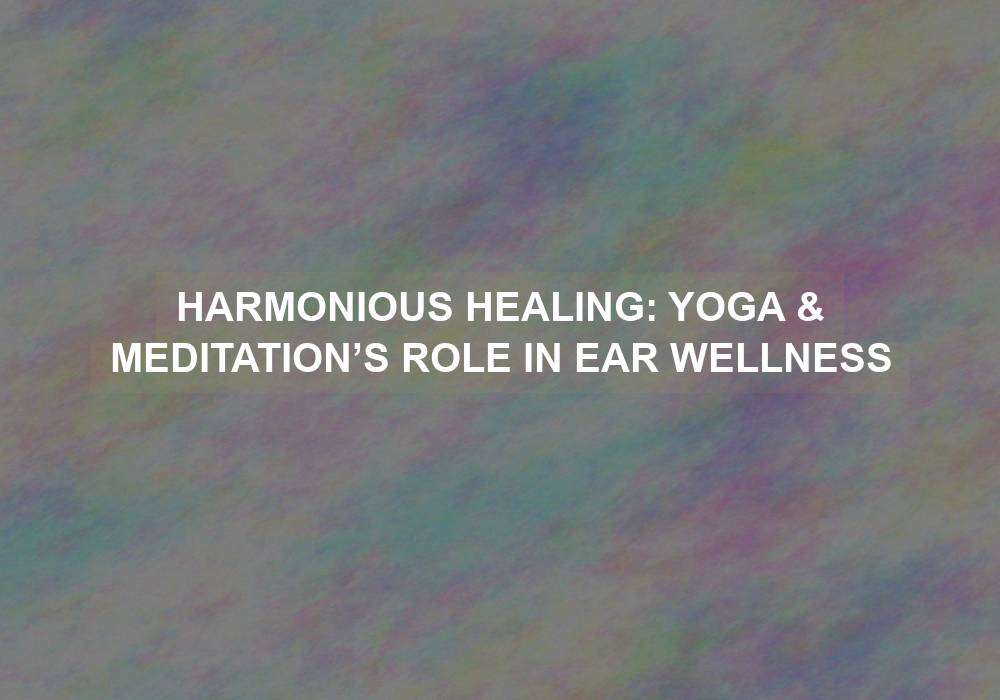The human body is a complex system where each organ plays a crucial role in maintaining our overall well-being. When it comes to health, we often focus on the more visible parts of our body, such as the heart, lungs, or muscles. However, it’s essential not to overlook the health of our ears, as they are vital for our ability to hear and maintain a sense of balance.
In recent years, there has been growing interest in alternative therapies that promote holistic well-being, such as yoga and meditation. These practices not only benefit our physical and mental health but can also have a positive impact on our ears. Let’s explore how yoga and meditation can contribute to ear wellness.
The Connection between Yoga and Ear Health
Yoga, an ancient practice that combines physical postures, breathing exercises, and meditation techniques, provides a comprehensive approach to well-being. While its benefits for cardiovascular health, flexibility, and stress reduction are well-known, yoga can also improve our ear health.
-
Improved Blood Circulation: Many yoga poses involve gentle twists, inversions, and stretches that enhance blood circulation throughout the body, including the ears. Good blood flow to the ears can help nourish the delicate structures within and maintain their optimal functioning. For example, poses like the Triangle Pose (Trikonasana) and the Forward Bend (Uttanasana) can stimulate blood flow to the ears, promoting their health and functioning.
-
Reduced Tension and Stress: Stress and tension can contribute to various ear-related issues, such as tinnitus (ringing in the ears) and earaches. Regular yoga practice helps relax the mind and body, reducing overall stress levels and promoting a sense of calm. This, in turn, can alleviate ear-related symptoms caused by stress. Poses like the Corpse Pose (Savasana) and the Bridge Pose (Setu Bandhasana) can help release tension and calm the nervous system, benefiting the ears.
-
Balanced Energy Flow: According to traditional yogic philosophy, the body has energy centers called chakras. One of these chakras, known as the Vishuddha or throat chakra, is associated with the ears, among other things. Certain yoga poses and meditation techniques can help activate and balance the energy flow in this chakra, supporting ear health. For example, practicing the Fish Pose (Matsyasana) and chanting the mantra “ham” can help stimulate and harmonize the Vishuddha chakra, promoting ear wellness.
The Benefits of Meditation for Ear Wellness
Meditation is a practice that involves focusing the mind and attaining a state of deep relaxation and clarity. While its primary benefits lie in mental well-being and stress reduction, meditation can indirectly contribute to ear wellness in the following ways:
-
Reduced Anxiety and Depression: Anxiety and depression can have physical manifestations, including ear-related symptoms like tinnitus and sensitivity to sound. Regular meditation practice has been shown to reduce anxiety and depression, potentially alleviating such symptoms and promoting overall ear health. Through mindfulness meditation, individuals can develop greater awareness of their thoughts and emotions, allowing them to better manage stress and anxiety, which can positively impact their ear health.
-
Enhanced Mind-Body Connection: Meditation helps cultivate a deeper understanding and connection between the mind and body. By becoming more aware of our physical sensations and internal processes, we can notice any discomfort or imbalances in our ears and take appropriate measures to address them. Through practices like body scan meditation, individuals can develop a heightened sense of bodily awareness, enabling them to detect any potential ear-related issues and seek appropriate medical attention.
-
Improved Sleep Quality: Sleep plays a vital role in overall health, including ear health. Lack of quality sleep can negatively impact our immune system, making us more susceptible to ear infections and other ear-related problems. Meditation can help improve sleep quality by reducing stress and promoting relaxation, indirectly benefiting our ear wellness. Practices like guided meditation for sleep or deep breathing exercises before bed can calm the mind and body, facilitating a peaceful and restorative sleep, which in turn supports ear health.
Yoga Poses for Ear Wellness
Yoga offers numerous poses that specifically target ear health and can be incorporated into a regular practice. Here are a few poses that can support ear wellness:
-
Neck Stretches: Gentle neck stretches can help relieve tension in the neck and shoulders, which can contribute to ear-related discomfort. Slowly tilt your head to each side, forward and backward, and hold each stretch for 30 seconds. These stretches help release any stress or tension built up in the neck and shoulders, ultimately benefiting the ears.
-
Shoulder Stand (Sarvangasana): This inversion pose improves blood circulation to the head and ears and can help alleviate ear problems like tinnitus. Beginners can start with supported shoulder stands using props or seek guidance from a qualified yoga instructor. The shoulder stand not only enhances blood flow to the ears but also promotes a sense of calm and relaxation throughout the body.
-
Child's Pose (Balasana): This resting pose promotes relaxation, reduces stress, and helps relieve tension in the neck and shoulders. It indirectly supports ear wellness by reducing stress-related symptoms. By practicing Child’s Pose, individuals can experience a gentle stretch in the neck and shoulders, releasing any built-up tension that may affect the ears.
Conclusion
Incorporating yoga and meditation into your wellness routine can have a positive impact on your ear health. From improving blood circulation to reducing stress and promoting relaxation, these practices offer a holistic approach to enhancing overall well-being, including the well-being of your ears. Remember, if you have specific ear-related concerns, it’s essential to consult with a healthcare professional or audiologist for personalized advice.
Note: The content above is provided in markdown format, as requested. It can be easily converted to other formats as needed.
